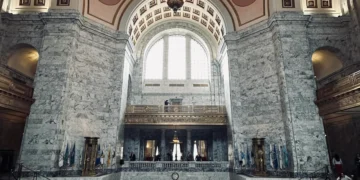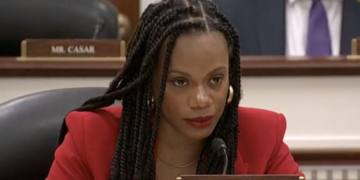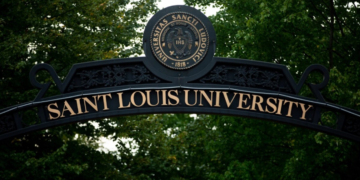Oct 15, 2024 Story by: Editor
The St. Louis Reparations Commission unveiled its final report on Tuesday, detailing the city’s history of chattel slavery and systemic discrimination, as well as the lasting effects on Black residents. The report highlights disparities in areas such as housing, education, health care, policing, and employment, and urges city officials to take steps to repair the damage caused by racial injustices. The commission recommends that reparations be extended to Black families who have left the city due to past racism and can prove residency, as well as those who can trace their ancestry to enslaved individuals in St. Louis.
This eight-member volunteer commission held 27 public meetings from April 2023 to September 2024, during which local experts shared information on topics including redlining, environmental harm, health disparities, policing, and the destruction of Black communities in St. Louis. Black residents provided testimonies about their experiences with racism and offered input on how the city should address the harm done over the years.
The testimonies revealed nearly 40 recurring themes, including the destruction of public housing, financial literacy issues, medical racism, and police violence. These themes were grouped into five core areas to shape the report’s historical analysis of racial discrimination and to propose a framework for achieving racial justice.
The commission’s report follows the reparations framework of the National Coalition of Blacks for Reparations in America, which defines reparations as a process of healing and restoring those harmed by the government or corporations due to their identity and violations of their human rights.
“We believe this report marks the beginning of a new chapter for St. Louis—one rooted in equity, accountability, and a shared commitment to healing,” stated Commission Chair Kayla Reed and Vice Chair Will Ross in the report.
Key Recommendations
The commission’s recommendations stemmed from testimonies given by nearly 109 Black residents, many of whom requested cash payments ranging from $5,000 per month to millions of dollars to be passed down to future generations. The commission, however, emphasized the need for a permanent reparations committee, with economic experts to calculate the proper scale of restitution and oversee the city’s implementation of these recommendations.
While the report does not specify an exact amount of financial compensation, it recommends general cash payments for individuals who can trace their ancestry to enslaved people, as well as Black residents impacted by systemic racism. It also urges the city to establish transparent, fair systems to determine eligibility for these payments.
One specific recommendation includes providing up to $25,000 to Black former residents or direct descendants of people who lived in Mill Creek Valley, Pruitt-Igoe public housing, and McRee Town—areas where thousands of Black families were displaced due to the city’s involvement in their destruction.
The report does not detail funding sources for the cash payments, though suggestions made during commission meetings include using funds from the St. Louis Rams settlement, unspent ARPA funds, marijuana tax revenue, or general city revenue.
Broader Recommendations Across Key Areas
The commission’s recommendations fall into two main categories: restitution to redress the harms inflicted on Black residents, and policy reforms to prevent future injustices.
Housing and Land Ownership
- Establish housing grants for descendants of enslaved people and those from historically redlined neighborhoods.
- Launch homeownership assistance, home repair programs, and property tax relief in disadvantaged Black communities.
- Allocate land for affordable housing projects aimed at Black individuals affected by discriminatory practices.
Neighborhood Environment
- Address pollution and health hazards in Black neighborhoods.
- Increase access to public parks and recreation facilities in these areas.
- Implement a fully funded North City Development Plan to revitalize underfunded Black neighborhoods.
Education
- Create scholarships for descendants of enslaved people.
- Fund after-school programs and tutoring in predominantly Black schools.
- Develop a Black history curriculum in public schools.
Public Health
- Continue funding the St. Louis Health Department, reducing reliance on federal grants.
- Increase support for community health centers in Black neighborhoods, focusing on addressing trauma from racism.
- Expand access to low-cost or free health services for low-income Black families.
Economic Justice and Wealth Creation
- Provide direct payments or tax relief for descendants of enslaved individuals and Black residents impacted by systemic racism.
- Offer business grants, low-interest loans, and job training programs to Black entrepreneurs.
Criminal Justice and Policing
- Establish a $25,000 reparations fund for victims of police violence.
- Implement restorative justice programs and civilian oversight of police misconduct cases, reallocating some of the police department’s budget to these efforts.
The report also calls for a public apology acknowledging the city’s role in slavery and its continued harmful policies, as well as a formal historical account that documents the city’s segregation and disenfranchisement of Black residents. It further suggests that St. Louis invest in initiatives to preserve Black culture and historical landmarks.
Quotes from public testimonies are included throughout the report to demonstrate the direct harm Black residents experienced, with the commission urging continued community advocacy for racial equity as one report alone cannot rectify all past injustices.
Challenges and Obstacles Faced by the Commission
Producing these recommendations was not without difficulty. Commission members balanced their work on the report with full-time jobs and limited funding. In late 2023, members asked Mayor Tishaura Jones to extend the commission’s timeline to gather more testimonies and finalize the report. They also requested a budget to compensate the experts involved and cover venue and advertisement costs, but these requests were repeatedly denied.
Kayla Reed mentioned in February that some commission members and their institutions covered the costs of venues and advertising, as the only financial support came from the Missouri Foundation for Health. Due to the lack of budget, the commission struggled to advertise meetings widely and attract a larger public turnout, a challenge faced by other cities pursuing reparations.
“Black folks don’t really trust anything that the government is doing. Many Black people just dismiss it as lip service, it’s not going to happen,” said reparations advocate Robin Rue Simmons in an interview with St. Louis Public Radio. “We [Evanston, Illinois] had a respectable turnout for our process, but relative to the subject matter, the opportunity, and the harm, we should have had standing room only.”
Mayor Jones will review the report to determine which recommendations are feasible for implementation, according to spokesperson Conner Kerrigan. Source: stlpr

















